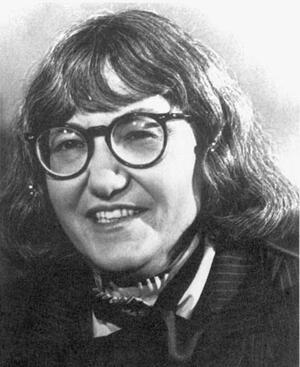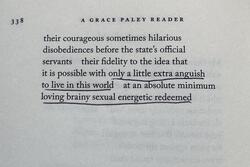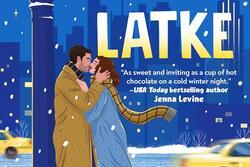Who would Cynthia Ozick’s Edelshtein envy now?
"I wanted to use what I was, to be what I was born to be—not to have a 'career,' but to be that straightforward obvious unmistakable animal, a writer," Cynthia Ozick once said. She has certainly achieved her goal. The winner of numerous literary awards, Cynthia Ozick is a writer par excellence, author of essays, plays, short stories and novels.
Institution: The Jacob Rader Marcus Center of the American Jewish Archives, Cincinnati, OH, www.americanjewisharchives.org and Gerard Murrell.
Reading Adam Kirsch’s excellent piece in Tablet on Isaac Bashevis Singer reminded me of my all-time favorite short story, Cynthia Ozick’s “Envy, or Yiddish in America,” wherein the hilariously bitter Edelshtein is obsessed with Yankel Ostrover (a Singer-like figure), consumed by the fact that Ostrover has obtained mainstream adulation through having his Yiddish writing translated into English.
Having immersed myself almost exclusively in creative nonfiction for the past few years, I decided to look at the contemporary Jewish women writers whose work is part of the evolving Jewish American canon. Whose literary success would Edelshtein envy now? Specifically, which women would he would envy? And how would they differ from the women writers who were Singer’s peers, like Ozick, whose characters mourn the death of Yiddish and whose Rosa wraps her baby Magda in a shawl to hide her in the camps. Or Grace Paley, whose immigrant characters weave in and out of assimilation and whose iron-strong renderings of immigrant speech often made the language itself a character.
I took a walk over to the library and picked up Lost Tribe: Jewish Fiction from the Edge, edited by Paul Zakrzewski, published in 2003.
For the young women writers featured in Lost Tribe, immigration is over, but the sense of being on the outside is very much present. I was struck by how heavily child narrators were represented—actual children, or young adults who are still very much dancing the dance of separation from their parents.
Reading Myla Goldberg’s Bee Season, I found what I think is one of my favorite metaphors that I’ve encountered in the past few years-- a boy’s blue shirt is “the color of deodorized toilet water.” Goldberg’s Eliza is a girl on the margins, whose spelling bee success allows her to think of herself as the kind of the girl who’s invited to play Red Rover, the kind of girl for whom a place in the lunch queue is saved, so that she doesn’t have to worry about the chocolate cake running out by the time she gets to the head of the line. One of her father’s congregants encourages Eliza for the upcoming spelling-bee by informing her that this is her opportunity to show the same courage that’s kept the Jews alive through centuries of persecution and exile. A spelling bee is not only a spelling bee, but a way to avenge the wrongs of the millennia of ignominies against the Jews. Much like the immigrants of earlier Jewish fiction, she dreams of being one of the in-group.
In Tova Mirvis’ “A Poland, A Lithuania, A Galicia,” Bryan, now after a semester in Jerusalem, Baruch, whose parents envisioned for him a moderate future of Modern Orthodoxy, maybe kosher and shomer Shabbos, but still Ivy League, desires to reverse what he sees as a dilution of a life lived with God, dons a black hat, and shuns the knit kippahs crafted for him as part of a Modern Orthodox courtship ritual. Bryan/Baruch wants to reverse immigration. Rather than craving assimilation, he seeks to reverse it.
In Suzan Sherman’s “Knitting One’s,” Dotsy, is in her early thirties, but very much a child, whose mother’s voice constantly swirls in her head, who gets her period and bleeds on the chair of a rabbi whom she attempts to interview for a free-lance piece, finds herself taking a knitting class in an elementary school classroom. Dotsy is also an odd girl out. Dotsy, like Edelshtein, envies—the objects of her jealousy are two blond young women, whom she has dubbed “the Marthas” for the Martha Stewart-like way they take to the knitting, the mammoth diamonds presented them by their Jewish fiancés sending off beams of light as they flash their needles. Pleasure radiates from Dotsy when the father-like rabbi whom she attempted to interview publicly shames the Marthas in the knitting class as “shiksas, stealers of Jewish men.”
Edelshtein, meet Goldberg, Sherman, Mirvis. Also Rachel Kadish, Aimee Bender, Judy Budnitz. I think you will like them. They need no translators. Just try not to be too jealous.
Margie Newman is a writer who lives in St. Paul, Minnesota. Margie was recently interviewed by Speakers' Lab in honor of its upcoming event, "Now What? The Future of New Jewish Culture," a moderated town hall-style event on Tuesday, May 15 in downtown NYC. "Now What?" brings together ten experts from across the country to discuss the last ten years of flourishing Jewish creativity in America and its precarious position today. The event is free and open to the public. To register and for more information, including pre-event panelists' statements and interviews with six emerging Jewish artists, including Margie Newman, please visit: www.speakerslab.org. This event is presented by the Posen Foundation U.S. through its new public programming initiative, Speakers’ Lab, and The Jewish Daily Forward, and is hosted by the 14th Street Y.







I loved reading about these Jewish female authors, most of whom I hadn't heard about. Thanks for expanding my reading list!
You have reminded me how rich the canon of Jewish women writers is. I love and envy the women in your post, and am excited to reacquaint myself with them now that you've reminded me why.